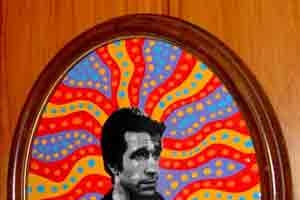Best Man Speech Tips: Relax, Inspire, and Amuse
7 simple tips to make the right kind of impact with your best man's speech
 Hypnosis can help you enjoy your best man's speech.
Hypnosis can help you enjoy your best man's speech.He'd been so terrified of his best man's speech he drunk half a bottle of whisky, tripped over the microphone, and belched casually at the audience before stumbling away. He'd made an impact all right, but not the one he (not to mention the bride and groom) had hoped for.
Mortified, Sean had "hidden away" for months and eventually moved to another town. But - "can you believe it!" - he'd been asked to be best man for another wedding; that of his new best buddy at work.
"I can't do to them what I did last time! I've always been shy, really, and I've never been good at speeches. Right now I'm looking for an excuse to get out of it. You're my only hope, Mark!"
I had to help Sean deal not just with his anxiety but also the content of his speech – which, I assured him, need not be too long. If you've also been enlisted to be a best man and are currently gearing up for your speech, here's some of what Sean and I looked at; it can help you too.
1) A speech is a story; so have a beginning, middle, and end
Yes, do have an end! All speeches need structure; whatever tangents you seem to go off on, you need to 'bring it all together'. Whether your speech is five minutes or twenty-five, you'll need clear signposts so you know where you are. For example, say you want to discuss Ken and Barbie's relationship thus far; you'll need to find the landmarks in order to plan your journey. Those might be:
- Recalling how Ken met Barbie at a chocolate tasting festival.
- How Ken called Barbie up the next day and sent her a box of chocolates, and how Barbie thought they were a complimentary gift from the festival organizers.
- How from the start we all thought how wonderfully suited they were for one another (above and beyond a shared passion for carob).
- How Ken knew Barbie was the one for him and confided that he felt Barbie would be his wife the moment they clapped eyes on one another.
Once you have mapped your landmarks, that's all you need. Don't try to memorize a whole script in your head, because it needs to sound spontaneous. But do have a well-rehearsed strong opener like:
"I just want to take a moment to thank all of you for being here (and looking so fantastic : ) ) on this wonderful occasion."
And a strong finisher such as:
"Here's to the new husband and wife. May they forever be happy!" (Say it like you mean it and if that doesn't get a round of applause, your audience are mannequins.)
2) Talk to them, don't read to them
Your role isn't to impart factual information; this is not a review meeting. You want your audience to have a good experience, not to meticulously retain facts. If they feel good during and after your speech, they won't care that they can't recall much of its content.
Think of your speech as a pre-arranged chat; a conversation you're having with a great friend. This doesn't mean cursing the way you normally might, but it does mean you can have lapses in memory, mispronounce words, and even - dare I say it - muddle the order of your 'signposts'.
That's all fine, really. All of the above are normal parts of everyday conversation and you don't suddenly change and become a formal robot just because you're making a speech. People like to see you are human, especially in this context.
3) Steer clear of the booze – at least before your speech!
The trouble with drinking is that it often seems like a good idea when it's not. Actually, that's true about lots of things...but I digress. Don't drink to 'calm your nerves'. People will know. Lest you label me a puritanical bore (bore I may be, but puritanical I am not!), have one or two because it's a wedding but keep a clear head.
I've seen it too often. People really believe they are better drivers, tightrope walkers, and speech makers when they are under the influence. The fact is, that's what it feels like, but not what it looks like.
One or two drinks may add sparkle, but too much more at this point will bring the shine off it quicker than someone near the front can say: "Oh my! I think he's pickled!"
Remember Sean's drunken best man 'speech'.
4) Remember - it's not about you!
I asked Sean what his aborted speech was going to be about.
"I had it all planned," he said. "I was going to tell them how I'd always wanted this couple to get together, how I was so pleased, and how I'd love to get married myself one day. I was going to tell them how I had been practicing my violin that morning, planning what I was going to say, and how a string on the violin had broken and how I'd seen that as a bad omen (which maybe it was) and how I..."
Stop!
Your job is to direct a beam of good feeling toward the bride and groom. Give your impressions and describe how you fit into the groom's life, but keep long-winded descriptions of your thoughts and feelings to a minimum. It's not about you. It's their special day and your words need to honour them. Any stories about you that don't focus on them will present you as egocentric.
Your speech needs to congratulate the newlyweds and celebrate them and their future life together, but a twist of humour will go a long way, so...
5) Have a laugh – with, not at
Bawdy humour may be very funny with your mates down the pub, but remember who your audience is. Saucy stories about the groom or bride's intimate past (pre-new spouse) may go down like a ton of bricks.
Keep mocking to a minimum; one chap I knew said he thought he'd offended the groom by repeatedly referring to him as "Shorty" throughout his speech. But clean...ish funny stories are worth the risk and will be appreciated because people expect to laugh at least a little during your speech. No one expects you to be a professional stand-up - people will appreciate the effort, but please...
6) Keep it snappy
If "brevity is the soul of wit," then succinctness is the spirit of speeches. This doesn't mean that your speech needs to be quicker than an Apollo countdown, but it does mean that it should move along at a nice rate. Nobody enjoys listening to laboured jokes or stories which seem terminally reluctant to 'get to the point'.
Enough said.
7) Prepare, relax, and dazzle
Using hypnosis, I helped Sean feel better about the last time he'd (tried to) give his best man speech and also helped his unconscious mind rehearse and prepare for the upcoming. Because it's not always enough to rehearse just what you're going to say; you also need to rehearse how you're going to feel, look, and come across.
Find time to relax and close your eyes. Take some deep breaths, particularly focussing on lengthening the out-breath. And just take a few moments to watch yourself, in your mind's eye, looking relaxed and in flow, walking up to the microphone, and then giving your speech with friendly confidence. This will help program your mind to feel naturally calm and confident in the situation itself.
But remember: you'll want to be sufficiently relaxed, but you don't have to be totally at ease. A slight display of nerves shows you take it seriously and again displays your humanity. You could even disclose slight nervousness by prefacing with something like:
"I'm new to this kind of thing but I want to do my best for these two, so bear with me... : )" or even: "I've always been a little nervous of doing speeches; so if I tremble and faint, you'll understand..." People like it when you poke a little fun at yourself.
This isn't a bad way to break the ice and get the audience onside with you, but you'll also find, as Sean did, that your audience want you to do well. Apparently, his best man's speech was sober, entertaining, moving, and congratulatory, but to the point. And I reckon yours can be, too.






